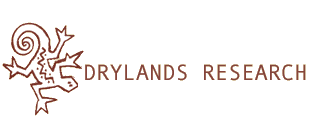|
About us
After many years of research on agricultural policy and management issues, Michael Mortimore and Mary Tiffen set up the Drylands Research partnership in 1998 (see Home) to carry out work on long term change and policy issues in dryland management in African countries.Their long term study of Machakos District, Kenya, 1930-60, carried out by the Overseas Development Institute (ODI) had generated a set of hypotheses and policy recommendations which Drylands Research tested and elaborated in four other African dryland environments, 1998-2002.
|
|
|
From Left to right:
Francis Gichuki, Mike Mortimore, Stephen Mbogoh, Peter Muasya, Abdou Fall, Mary Tiffen, Charles Nzioka, Joseph Mbuvi. These were members of the Kenyan team (with the exception of Abdou Fall, visiting from Senegal).
|
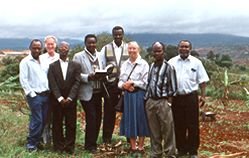 |
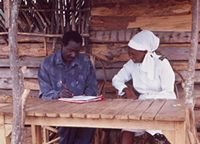 |
Michael Mortimore was a geographer (Liverpool University) who taught and researched at Ahmadu Bello University, Zaria, Nigeria between 1962 and 1979, and was Professor of Geography at Bayero University, Kano from 1979 to 1986, well remembered in both by grateful students.Subsequently he carried out research studies as a Senior Research Associate in the Department of Geography, Cambridge University, the Overseas Development Institute and as an Honorary Fellow of the Centre of West African Studies, University of Birmingham. His research and publications have focused on environmental management by smallholders in the drylands of Africa. This distinguished scholar sadly died in September 2017. Fuller details on his life and work and publications after 2003 are available at: https://en.wikipedia.org/wiki/Michael_Mortimore |
| Mary Tiffen Tiffen is a historian (Cambridge University) and socio-economist who began her development studies career at Ahmadu Bello University, Nigeria, where she taught Economic History and Applied Economics of Nigeria, and began a study of economic growth in Gombe Emirate 1900-68. This led to her PhD at the London School of. Economics and a book. Work and consultancy in the Middle East on irrigated agriculture led to an appointment at the Overseas Development Institute, 1983-94, as a Research Fellow in charge of its Irrigation Management Network. She developed annual special issues on African irrigation. She later chaired its Agricultural Administration Unit. From 1990-94 Dr Tiffen led the multi-disciplinary study of Machakos District, Kenya, leading to promotion to Professorial rank. She resigned in 1994. She has published many articles on irrigation, soil conservation and agricultural development. Later articles take a broader look at long term processes of economic and social change in Africa. In retirement she turned to her interesting family history, leading to a book on Sir Robert Hart, still regarded in China as a good friend who helped their first steps to modernisation. Another development topic! It is also available in Chinese. See Tiffaniabooks.com.
Contact: mary.tiffen@gmail.com
|
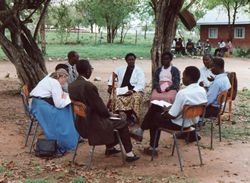 |
| John Nelson studied Politics and Economics at Vanderbilt University USA and took a Masters in Agriculture at Wye College in 1991. He was recruited to Drylands Research to research non-farm activities amongst the households of farmers interviewed in each country. He authored the Working Papers on this and attended the closing Workshop in London, 2001 where this was one of the vigorously discussed topics, taken up by others in subsequent years. From 2000-16 he worked for the Forest Peoples Programme and in 2018 was still active in this field. Country leaders - Four Country Study: |
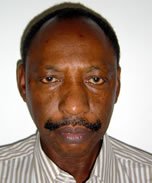 |
Francis Gichuki is an agricultural and irrigation engineer. He obtained his PhD at Utah State University, USA in 1988. He taught and researched on soil and water engineering (irrigation, drainage, water harvesting and soil and water conservation), river basin management, modelling, and GIS at the University of Nairobi from 1978 to 2002. He was later with CGIAR and the leader of Integrated Basin Water Management Systems theme of the Challenge Programme on Water and Food (www.waterforfood.org). He was involved in research on various aspects of integrated water resources management within a river basin context. He was responsible for synthesis research on enhancing basin level agricultural output and water productivity with specific focus on
(a) innovative technologies and management practices;
(b) effective institutional arrangements; and
(c) decision support tools and information. He has now returned to his former post as Professor of Agricultural Engineering at Nairobi University
|
| Adama Faye, Docteur en agronomie option productions animales. Expérience d'une vingtaine d'années de recherche à l'Institut Sénégalais de Recherches Agricoles (I.S.R.A.) occupant différentes postes de responsabilité (chef de la division agropastorale du centre national de recherche de Bambey, coodinateur de l'équipe système de production, transfert de technologie et économie de l'eau dans la région du Sine Saloum, chef du centre de recherche zootechnique de Kolda et chargé de mission Recherche-développement à la Direction Générale de l'ISRA) et travaillant sur différentes questions de recherche comme (1) l'intégration agriculture - élevage (2) les systèmes de production et le transfert de technologies en zones semi-aride (3) l'amélioration du bétail trypanotolérant dans les systèmes de production de la zone sub-humide du Sénégal (4) articulation entre la recherche et le développement: le pilotage par la demande. Actuellement responsable du Bureau d'Appui à la coopération sénégalo-suisse à Dakar (Sénégal) et animateur d'un programme de renforcement des capacities des acteurs du dévéloppement agricole et rural.
|
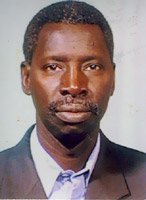 |
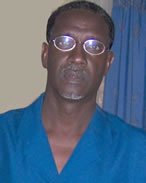
|
Yamba Boubacar est Géographe, enseignant chercheur à L'Université de Niamey au Niger. Depuis plusieurs années il effectue ses recherches sur les systèmes agraires en particulier dans le centre sud du Niger. Il a surtout mené de nombreuses recherches dans le domaine de la gestion des ressources naturelles. Il collabore avec plusieurs institutions de recherche dont Drylands Research.
|
| Dr J Ayodele Ariyo is a Professor in Geography at Ahmadu Bello University, Zaria, Nigeria. His teaching and research interests are in regional planning and resource development, and he has published extensively in these areas. Dr Ariyo also has wide-ranging consultancy experience in locally and internationally funded projects. |
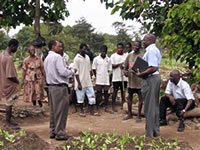 |
|
|
Selected books and articles published by Michael Mortimore and Mary Tiffen prior to 2002
Mortimore, M. (1989) Adapting to drought, farmers, famines and desertification in West Africa. Cambridge University Press, Cambridge, U.K.Cambridge University Press.
Mortimore, M. (1998) Roots in the African dust: sustaining the Sub-Saharan drylands. Cambridge University Press, Cambridge, U.K.
Mortimore, M. (2000) 'Hard questions for 'pastoral development': a northern Nigerian perspective', in E. Tielkes, E. Schlecht, & P. Hiernaux, eds. Elevage et gestion de parcours au Sahel, implications pour le développement: 101-114. Verlag Grauer, Stuttgart, Germany.
Mortimore, M. (2001) 'Overcoming variability and productivity constraints in Sahelian agriculture', in T. A. Benjaminsen & C. Lund, eds. Politics, property and production in the West African Sahel: Understanding natural resources management: 233-255. Nordiska Afrikainstitutet, Uppsala.
Mortimore, M. (2002) 'Development and change in Sahelian dryland agriculture', in D. Belshaw & I. Livingstone, eds. Renewing development in Sub-Saharan Africa: Policy, performance and prospects: 135-152. Routledge, London.
Mortimore, M. and Adams, W.M.(1999) Working the Sahel: environment and society in northern Nigeria. Routledge, London & New York
Mortimore, M. and Adams, W.M. (2001) 'Farmer adaptation, change and 'crisis' in the Sahel', Global Environmental Change, 11/1: 49-57.
Mortimore, M., Harris, F., and Turner B. (1999) 'Implications of land use change for the production of plant biomass in densely populated Sahelo-Sudanian shrub-grasslands in north-east Nigeria', Global Ecology and Biogeography, 8 243-256.
Tiffen, M. (1976) The enterprising peasant: Economic development in Gombe Emirate, North Eastern State, Nigeria, 1900-1968. Her Majesty's Stationery Office, London.
Tiffen, M. (1990) ' Land tenure issues in irrigation planning, design and management in Sub-Saharan Africa', in J. R. Moris & D. J. Thom, eds. Irrigation development in Africa: Lessons of experience: Westview Press, Boulder.
Tiffen, M. (1995) 'Population density, economic growth and societies in transition: Boserup reconsidered in a Kenyan case-study', Development and Change, 26 31-66.
Tiffen, M. (2002) 'The evolution of agroecological methods and the influence of markets: case strudies from Kenya and Nigeria', in N. Uphoff, ed. Agroecological innovations: increasing food production with participatory development: 95-108. Earthscan Publications Ltd, London.
Tiffen, M. and Mortimore, M. (1990) Theory and practice in plantation agriculture: an economic review. Overseas Development Institute, London.
Tiffen, M. and Mortimore, M. (1994) 'Malthus controverted: The role of capital and technology in growth and environment recovery in Kenya', World Development, 22/7: 997-1010.
Tiffen, M., Mortimore, M., and Gichuki F. (1994) More people less erosion: environmental recovery in Kenya. John Wiley & Sons, Chichester, UK
Mary Tiffen and M.R. Mulele, M.R. The Environmental Impact of the 1991-2 Drought on Zambia. IUCN, Gland, Switzerland and Lusaka, Zambia, 1994.
|
